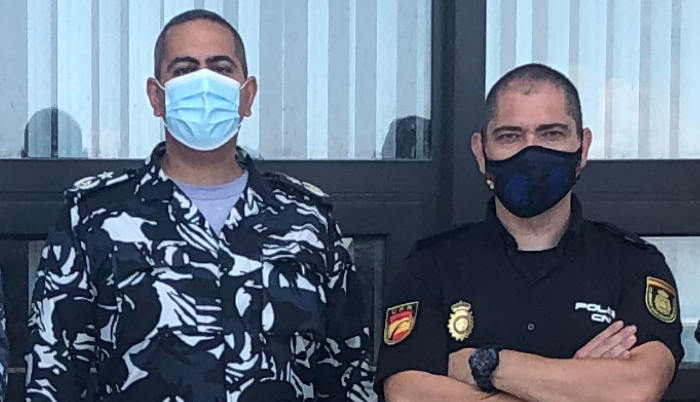-
23 September 2021
Category : Interview
‘The project aims to strengthen trust between Lebanese citizens and the Lebanese police’
We spoke to Joaquín Plasencia García, Chief Inspector of the Spanish Policía Nacional and Team Leader of the project funded by the European Union and entitled "Promoting community policing in Lebanon". Plasencia offers his vision on the mission of the Lebanese National Police (also called Internal Security Forces) in the current context of the country. The project is managed by the FIIAPP.
 The Chief Inspector of the Policía Nacional with a member of the Lebanese Internal Security Forces
The Chief Inspector of the Policía Nacional with a member of the Lebanese Internal Security ForcesWe spoke to Joaquín Plasencia García, Chief Inspector of the Spanish Policía Nacional and Team Leader of the project funded by the European Union and entitled “Promoting community policing in Lebanon”. Plasencia offers his vision on the mission of the Lebanese National Police (also called Internal Security Forces) in the current context of the country. The project is managed by the FIIAPP.
What does the project aim to achieve?
The “Promoting community policing in Lebanon” project aims to introduce fundamental changes in the nature and culture of the police in Lebanon. Its main objective is to promote social cohesion through the transformation of the outdated concept of “Police Force” towards the more current and necessary concept of “Police at the Service of Citizens”. The aim of this transformation is to strengthen ties of trust and cooperation between citizens and the police, a relationship that has deteriorated during the latest political and social events that the country has been going through.
What situation is the Lebanese National Police operating in today?
The Lebanese National Police (ISF – Internal Security Forces as it is known in English) finds itself at a crossroads between the needs of the Lebanese people, the police service’s vocation to serve citizens, and the obeying of government orders.
The current situation of political, social, health and economic crisis that Lebanon is suffering increases citizens’ demands which require immediate responses and changes. The country is in an unprecedented crisis that, even for many, is worse than the one experienced during the civil war that ravaged the country between 1975 and 1990. In the face of great impoverishment, the Lebanese are left to subsist with the minimum to feed their families, secure medicine for their sick and meet their needs.
This reality is behind the increase in demonstrations in the streets, many of which have ended in violence. The recent clashes between police and protesters have left huge scars on both “sides”; on the one hand, some citizens are suffering the result of police action with arrests and injuries, but, on the other, some police officers have also ended up injured and incapacitated for days. To these physical injuries must be added the psychological and emotional burden that their duties entail, especially when they must confront family and friends at home.
ISF officers are men and women, sons, daughters, mothers and fathers of Lebanese people, who have seen how their profession, which they freely and voluntarily chose in order to “Serve and Protect”, is being decimated, and not only economically, like the rest of the country, but also as a public institution at the service of citizens. The recent demonstrations have in effect set up the police as the target of anger and frustration at the crisis and the corruption of their rulers.
How are the Lebanese police seen by the citizens? And in Spain?
The citizens do not trust national institutions and only the army enjoyed, until recently, a certain amount of their respect.
In Spain, the Sociological Research Centre (CIS) estimates that almost 55% of the population appreciates the work of the Guardia Civil and Policía Nacional. The Police, Guardia Civil and Army are one of the institutions best valued by citizens in Spain. In fact, the rise in citizen valuation reflected by the CIS seems to be endless. If, in 2013, the Cuerpo Nacional de Policía obtained a valuation of 5.65, in 2015 the Policía Nacional obtained a valuation of 5.95, while in 2016 it reached a valuation of 6.8 that leaves the valuation of previous years far behind. These positive results are only explained by the dedication to public service, professionalism and sacrifice of the Cuerpo Nacional de Policía. In the Policía Nacional in Spain the feeling of being an integral part of society is shared, not only with regards serving and protecting society, but also as regards understanding its demands and accepting constructive criticism so as to maintain, increase and never lose the trust of citizens.
What professional standards are required of members of the Lebanese internal security forces?
The professionalism of members of security forces is measured by excellence in their work, by loyalty to the institution to which they belong, and respect for the rule of law and Human Rights. But at the same time, it is also necessary to establish a special connection with citizens to offer them a quality service in the security sector.
If we have realised something over the time the FIIAPP community policing project has been underway, it is that the ISF is made up of professionals who are committed to citizens; to new and old generations that are pushing to introduce improvements in the organisation, through projects like ours that are trying to “Improve, Maintain and Never Lose the trust of citizens”.
Over the next 4 years of implementation we hope to be able to tell you about real and specific achievements resulting from our Community Policing Support Project.
The views and opinions expressed in this blog are the sole responsibility of the person who write them.




